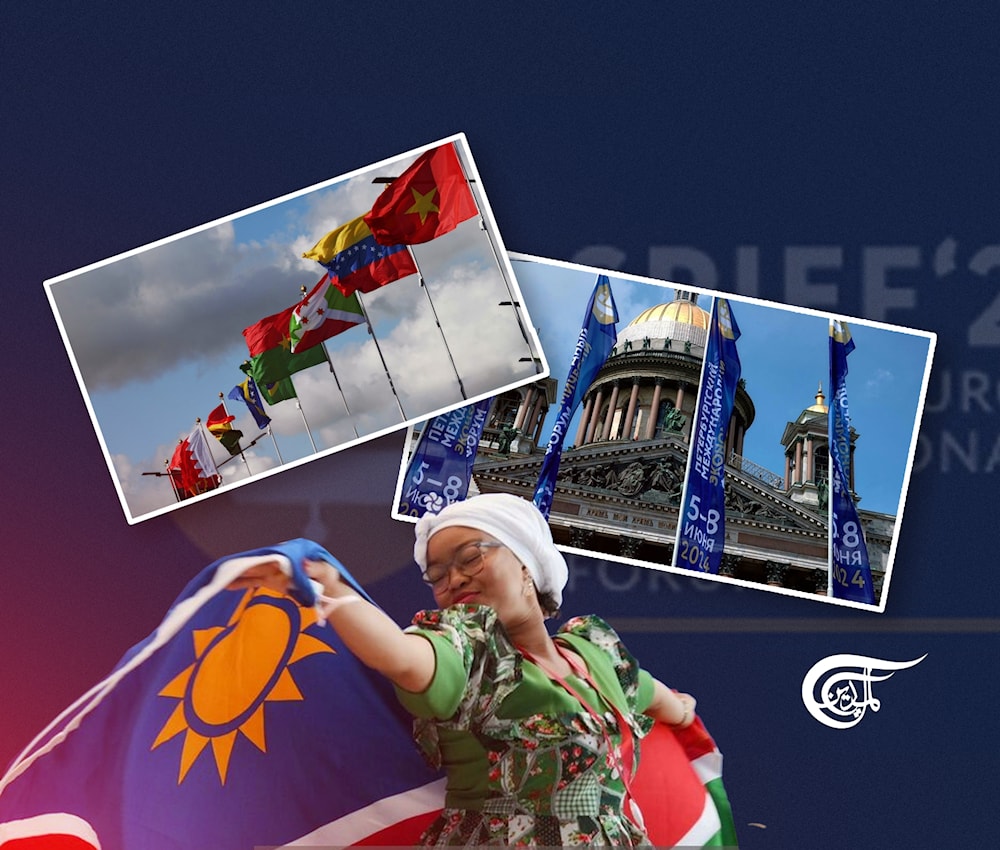Spief24: Economic and social prospects for confronting Western hegemony attempts
Moscow held high hopes this year in light of the Western economic blockade on Russia and the ongoing war in Ukraine.
-

Spief24: Economic and social prospects for confronting Western hegemony attempts (Illustrated by Mahdi Rtail; Al Mayadeen English)
The work of the St. Petersburg International Economic Forum continues with the participation of 136 countries, politicians, and government representatives from more than 45 countries, including the BRICS countries, who will meet in the Russian city of Kazan next October.
The achievements of the previous year's forum, which saw the conclusion of more than 900 agreements worth nearly 4 trillion rubles, led Moscow to hold high hopes this year in light of the Western economic blockade on Russia and the ongoing war in Ukraine.
What the Palestinians are going through now is absolutely brutal
The war of Genocide waged by "Israel" against civilians in Gaza was present in the speech of the Russian Foreign Ministry’s official spokeswoman, Maria Zakharova, who told Al Mayadeen English: “Russian support for the Palestinians is multifaceted. We sent humanitarian aid to this region in an organized manner, to people who have been suffering, not only for several months but for many years. We also did everything to remove Palestinian citizens who have shared families with Russian citizens. We removed them not from the area of war, but from an area where civilians are being killed.”
“A relationship that is much more than just an alliance.” This is how Zakharova described the relationship between the United States and "Israel". But it turned out that America did the worst thing toward its closest allies, according to Zakharova, who stressed that “the Russian approach, which is based on international law regarding the situation in the Middle East region in the context of the Palestinian-Israeli conflict, is a fair, honest and legal approach that can actually get the situation out of the dead end to which he was paid.”
Zakharova considered that what the Palestinians are going through now is extremely brutal, not to mention the number of victims. “Those circumstances and the international situation in which all this is happening is unprecedented.”
She concluded her speech by saying, “After all, for several months we have not heard a single word of condemnation of such actions by those for whom human rights, democracy, and the protection of civilians are the foundations of life.”
The influence of the G7 is declining
On the economic side, discussions about the BRICS countries took a large part in the forum, where José Pio Borges, the chairman of the Board of Trustees of the Brazilian Center for International Relations, confirmed that the G7 countries, which were once powerful Western industrial countries, witnessed a decline in their influence over time.
“In 2020, the BRICS countries - before enlargement - outperformed the G7 in terms of GDP given purchasing power parity," he said.
On the other hand, the BRICS countries have achieved great progress in terms of gross domestic product, economic growth, and population numbers, according to Borges, who further explained that "the population of the BRICS countries before the expansion was 3.2 billion, while the population of the G7 countries is only 800 million citizens. More importantly, the per capita growth of the BRICS economies is 4.5%, which dwarfs the per capita growth of the G7 by three."
It is necessary to create a common digital currency
“The process of de-dollarization protects us from risks in the literal sense of the word”. With this statement, the director of the BRICS Research Center and a professor at the School of International Relations at Verdun University in Shanghai, Shen Yi, opened his speech and continued, saying, “The United States is exploiting the advantages of the dollar to impose sanctions and thus undermine the stability of the dollar as an international currency. Therefore, it is necessary at the present time to discuss the practical aspects of creating a common digital currency, not immediately, but at least the practical aspects of its creation and the development of technical standards to meet the development characteristics of the BRICS countries must be discussed.”
Shen Yi considers that the need to build a new system is not about moving away from the dollar, but rather about creating a currency system that is more responsive to fluctuations.
He explains that "the United States must realize that economic multipolarity has become a practical reality. I think we are now witnessing changes that affect the foundations of the dollar system. The basic condition for the formation of this system was the overwhelming advantage of the United States in politics and economics, but the problem is that since the 1970s, there has been a gap between the dollar system and the international situation.”
BRICS is a unit of difference
During the sessions, a main axis was also touched upon: traditional values, culture, and soft power. In this context, the Russian political philosopher Alexander Dugin described BRICS as a unity between different countries with different cultures that came together to protect traditional values from Western influence, saying, "The BRICS countries are completely different from the G7 because they are built on respect for different cultures and traditions and are therefore a unity of differences.”
There is a lot of contradiction between the Islamic world and India, and a lot of differences between the Chinese model and the Islamic model, between India and China, between Africa and the Islamic world, and Russia is an Orthodox Eurasian civilization, but “we are united by one thing, which is that we all focus our civilizations on traditional values, and the West promotes unconventional values, he believes that he is the only one who is right,” according to Dugin.

 Sara Salloum
Sara Salloum
 5 Min Read
5 Min Read











